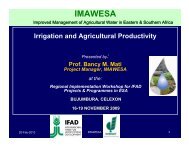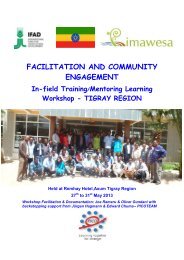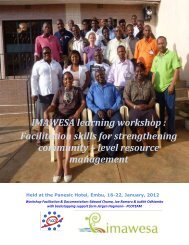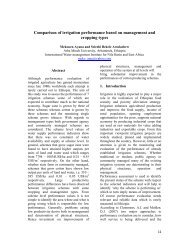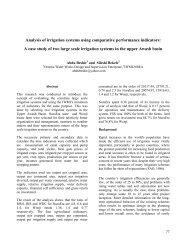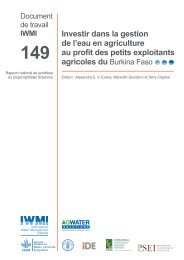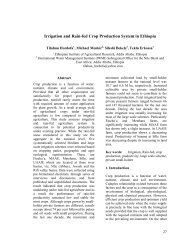- Page 1 and 2: ManualParticipatory Rapid Diagnosis
- Page 5: PRDA ManualiiiContentsForewordAvant
- Page 10 and 11: viiiForwardcomme des organisations
- Page 12 and 13: xAcknowledgementsIn Ethiopia• Dod
- Page 15 and 16: PRDA ManualxiiiAcronymsACCORDACSIAI
- Page 18 and 19: 2 Chapter 1. Introduction• change
- Page 22 and 23: 6 Chapter 2. Overview of ProcedureA
- Page 24 and 25: 8 Chapter 2. Overview of ProcedureP
- Page 26 and 27: 10 Chapter 2. Overview of Procedure
- Page 28 and 29: 12 Chapter 3. Constituents of irrig
- Page 30 and 31: 14 Chapter 3. Constituents of irrig
- Page 32 and 33: 16 Chapter 3. Constituents of irrig
- Page 34 and 35: 18 Chapter 3. Constituents of irrig
- Page 36 and 37: 20 Chapter 3. Constituents of irrig
- Page 38 and 39: 22 Chapter 3. Constituents of irrig
- Page 40 and 41: 24 Chapter 3. Constituents of irrig
- Page 42 and 43: 26 Chapter 3. Constituents of irrig
- Page 44 and 45: 28 Chapter 4. Planning of PRDAlooki
- Page 46 and 47: 30 Chapter 4. Planning of PRDAowner
- Page 48 and 49: 32 Chapter 4. Planning of PRDAAnnex
- Page 50 and 51: 34 Chapter 4. Planning of PRDATime
- Page 52 and 53: 36 Chapter 5. Using PRDA tools effe
- Page 54 and 55: 38 Chapter 5. Using PRDA tools effe
- Page 56 and 57: 40 Chapter 5. Using PRDA tools effe
- Page 59 and 60: PRDA Manual43ReferencesBurt, C. 200
- Page 61 and 62: PRDA Manual 45Annex ADescription of
- Page 63 and 64: PRDA Manual 47Contents of Annex ASt
- Page 65 and 66: PRDA Manual 49of the Rapid Diagnosi
- Page 67 and 68: PRDA Manual 51Box A2. Guidelines fo
- Page 69 and 70: PRDA Manual 535. Perform the remain
- Page 71 and 72:
PRDA Manual 555. Make step-by-step
- Page 73 and 74:
PRDA Manual 57(Plot distributioneff
- Page 75 and 76:
PRDA Manual 59Figure A1. Transect o
- Page 77 and 78:
PRDA Manual 61Materials• large ma
- Page 79 and 80:
PRDA Manual 63Box A5. Guidelines/ch
- Page 81 and 82:
PRDA Manual 65Crop rotation calenda
- Page 83 and 84:
PRDA Manual 67Seasonal calendarWhyT
- Page 85 and 86:
PRDA Manual 69Box A6. Guidelines fo
- Page 87 and 88:
PRDA Manual 71Table A7. Time line o
- Page 89 and 90:
PRDA Manual 73Table A8. Historical
- Page 91 and 92:
PRDA Manual 75Box A7. Guidelines/Ch
- Page 93 and 94:
PRDA Manual 77• Overlapping circl
- Page 95 and 96:
PRDA Manual 795. Discuss the matrix
- Page 97 and 98:
PRDA Manual 81Figure A6. Division o
- Page 99 and 100:
PRDA Manual 83Table A11. Organizati
- Page 101 and 102:
PRDA Manual 85Column 5 (optional):W
- Page 103 and 104:
PRDA Manual 87Table A12. Legal and
- Page 105 and 106:
PRDA Manual 89Input and market chai
- Page 107 and 108:
PRDA Manual 91Rapid benchmarkingWhy
- Page 109 and 110:
PRDA Manual 93Constraint rankingWhy
- Page 111 and 112:
PRDA Manual 95Box A12. Rapid Diagno
- Page 113 and 114:
PRDA Manual 97Cause-effect diagramm
- Page 115 and 116:
PRDA Manual 99Figure A9. Cause-effe
- Page 117 and 118:
PRDA Manual 101Figure A10. Criteria
- Page 119 and 120:
PRDA Manual 1038. Decide which solu
- Page 121 and 122:
PRDA Manual 105Action plan matrixWh
- Page 123 and 124:
PRDA Manual 107Transfer of responsi
- Page 125 and 126:
PRDA Manual 109Monitoring and Evalu
- Page 127 and 128:
PRDA Manual 111Annex BReporting She
- Page 129 and 130:
PRDA Manual 113Reporting Sheet 2b a
- Page 131 and 132:
PRDA Manual 115MethodsName of selec
- Page 133 and 134:
PRDA Manual 1171.3. LayoutSize of s
- Page 135 and 136:
PRDA Manual 119SHEET 2a: Data colle
- Page 137 and 138:
PRDA Manual 121PRDA Manual Annex C
- Page 139 and 140:
PRDA Manual 123PRDA Manual Annex C
- Page 141 and 142:
PRDA Manual 125PRDA Manual Annex C
- Page 143 and 144:
PRDA Manual 127PRDA Manual Annex C
- Page 145 and 146:
PRDA Manual 129PRDA Manual Annex C
- Page 147 and 148:
PRDA Manual 131PU12PU13PU14PU15PRDA
- Page 149 and 150:
PRDA Manual 133PRDA Manual Annex C
- Page 151 and 152:
PRDA Manual 135PRDA Manual Annex C
- Page 153 and 154:
PRDA Manual 137WU11WU12WU13WU14WU15
- Page 155 and 156:
PRDA Manual 139PRDA Manual Annex C
- Page 157 and 158:
PRDA Manual 141CS11CS12CS13CS14CS15
- Page 159 and 160:
PRDA Manual 143PRDA Manual Annex C
- Page 161 and 162:
PRDA Manual 145PRDA Manual Annex C
- Page 163 and 164:
PRDA Manual 147PRDA Manual Annex B
- Page 165 and 166:
PRDA Manual 149PRDA Manual Annex B
- Page 167 and 168:
PRDA Manual 151PRDA Manual Annex B
- Page 169 and 170:
PRDA Manual 153PRDA Manual Annex B
- Page 171 and 172:
PRDA Manual 155PRDA Manual Annex C
- Page 173 and 174:
PRDA Manual 157PRDA Manual Annex B
- Page 175 and 176:
PRDA Manual 159Annex CBrief present
- Page 177 and 178:
PRDA Manual 161Most training sessio
- Page 179 and 180:
PRDA Manual 163Table C2. Selected s
- Page 181 and 182:
PRDA Manual 165Learning goalsAt the
- Page 183 and 184:
PRDA Manual 167Figure C1. Overview
- Page 185:
(Back cover)This manual has been de




